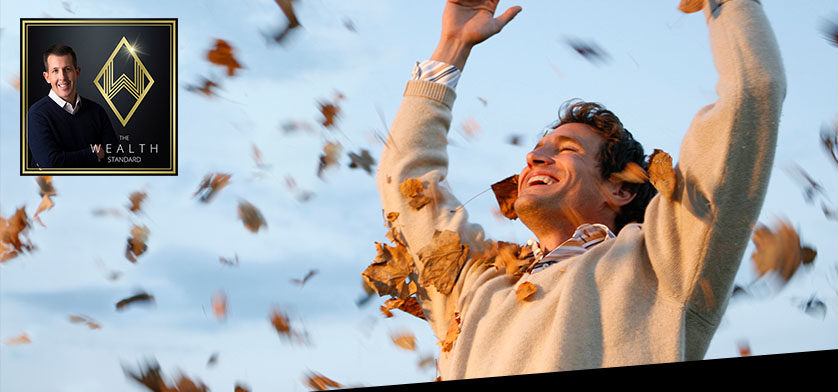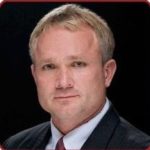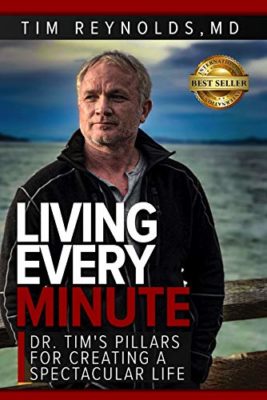The First Step Through Fear With Tim Reynolds, M.D.
Podcast: Play in new window | Download

The past is a great place to learn from, but it’s gone. It won’t do us any good to dwell on it. Patrick Donohoe introduces Tim Reynolds, M.D., the Founder of Living Every Minute. Tim talks with Patrick about how many people dwell in the past, which is not a great place to live. Are you afraid of the future? Don’t be. We don’t even know if it’s coming! We’re all just passing through this life, so let’s enjoy the time we have and the gifts we were given.
—
Watch the episode here:
Listen to the podcast here:
The First Step Through Fear With Tim Reynolds, M.D.
This episode is sponsored by the new and improved Financial Independence Calculator found at TheWealthStandard.com/calculator. One of the driving forces of human beings is freedom, which infers financial freedom too. Years ago, I set out to discover how any individual, regardless of their financial situation, could evaluate their finances in five minutes or less and have a firm date when they could achieve financial independence. The latest version of this calculator, which is free for the audience, can be found at TheWealthStandard.com/calculator. The calculator is going to take you only a few minutes to complete and it’s going to provide you with a specific financial independence date. Go check it out.
The following five episodes are with businessmen, investor, doctor and author Tim Reynolds. The interview was in person. It was in my office. If you’re reading the episodes and want to watch the videos, go head over to TheWealthStandard.com. It’ll have a link there. When the five segments are complete, we’re going to post the entire interview on our YouTube channel. Make sure you check that out.
A little bit about Tim. Tim is a former Green Beret in the Special Forces. He was a medic and also a battalion surgeon. He graduated from Texas A&M with his Medical degree. His specialization was Emergency Medicine. He was an emergency room doctor for several years and also co-started a company called HealthCARE Express. He has 15 or 16 locations throughout Texas, Oklahoma, Arkansas and Louisiana.
He has his book. You can check it out on Amazon. It’s called Living Every Minute. It’s also on Audible. He reads the Audible audiobook. Tim is an amazing guy. He’s one of the first original platinum partners with Tony Robbins. His love and zest for life is throughout his book. It’s going to be throughout this interview. You can imagine in the roles that he’s played, he has experienced firsthand the fragility of life. He’s going to share some of those experiences throughout these five segments.
I want to forewarn you. This is a PG 13-ish interview. There’s some colorful language and there are also some relatively graphic stories that Tim tells but you are going to experience him, his heart and his passion for life. You can check his website out. It’s LivingEveryMinute.com. He has some personal development programs, courses and a lot of other resources that you will want to check out. Go head over there. Without further delay, let’s start episode one with my dear friend, Tim Reynolds.
—
What led to the title and maybe describe what the philosophy is of that title?
Living Every Minute is something that I came up with years ago. The concept or the idea was the past is gone. It’s a great place to learn from but it’s gone. There isn’t anything you can do about it and yet so many people live there or dwell. It’s not a great place to live. It’s a nice place to visit and a great place to learn from. The future is unknown. Maybe this might be your last interview. There’s an earthquake. We leave here and the building falls down. This is it. We never know. The future is uncertain.
It’s something we should plan for because if it’s coming, your business and all businesses knows, you need to have a plan for that. It’s also not a place you want to live. The whole Living Every Minute philosophy has learned from the past, plan for the future and then once you’ve done those two things, spend your time living every minute, in this minute, in this time because this is the only day we get. As far as we know, this is it.
I’m making this as an assumption that being an emergency room doc wasn’t your average family practice where you had. This is a routine thing. You didn’t know what to expect on a day-to-day basis. Some of the stories you tell pull on the heartstrings, some of the kids’ stories or the older depressed people’s stories. What’s your experience as an emergency room doc? Is that what credit or played a part?
It’s certainly a big part. I would see people who would come in. I was putting the philosophy together in my head at that time. I didn’t have that completely yet but I would see, “I hope they kissed him goodbye this morning.” They were in a fight. He took off in the car and killed himself or we have a guy who came in and this isn’t in the book. He went to the doctor and the doctor said, “You have prostate cancer.” For those of you who don’t know, prostate cancer is very slow-growing. You’ll have prostate cancer for 20, 30 years sometimes. Usually, you’ll die of something else before you die of prostate cancer.
All this gentleman heard was cancer. He went home, took his 45, drove out in the field and shot himself in the head. I was like, “I hope he remembered to tell everybody.” The whole philosophy, I would see case after case like this of these tragedies that would happen as you say. You start realizing this is the only day. It’s all that we have and know about, for sure. If you waste this minute, this day or this time living, regretting something you did, wishing you would have done something else or so obsessed about what might happen, which is our society, “What might happen? What does this mean,” then you forget to have gratitude for where you’re at.
It comes to our perspective of life where we think we’re going to live forever. There are examples of people everywhere. We have medicine and competitive things. Life isn’t as dangerous as it was even years ago. You have stories that we hear but nobody realized it. They say, “That will never happen to me.” Therefore, you think as far as the future is concerned, they dwell on the past. They don’t operate at the moment.
The antithesis, particularly during these last years, was everybody so afraid. They went from thinking they were going to live forever to thinking that just walking past somebody is going to kill them. Both of those two are bad. We have this great moment that we’re in that we can live well. Nobody lives her life. We’re all dying. Let’s enjoy the time we have. The gifts were given. God gives us our health, our body, where we live and our family. We give back to God the things we do with those things. What do we make and do with those things? That’s the Living Every Minute philosophy.
The past is a great place to learn from, but it's gone. Yet many people dwell there. It's not a great place to live. Share on XWhat are maybe some of the other major impact points of your life that led you down the path to some of the careers?
One of the biggest was I’m the oldest of six kids. My dad was a truck driver. Mom was a stay-at-home mom and so we didn’t have a lot of money. The good news is nobody around us had any money either so we didn’t know we didn’t have any money. I became obsessed with this idea over time especially as I got into high school. I was like, “I don’t like being poor.” I don’t like it. I can do it but I see people with this abundance. I never went through the period where I hated those people. I went through the period of thinking, “How do I get that? How do I get some more of that?”
I became obsessed with the idea of how do I do that? How do I get to that point? That was a big thing that led my life. I remember at eighteen years old telling my girlfriend at the time. She said, “What are you going to do with your life?” Here I am at eighteen, I said, “I’d like to be a doctor. I’d like to travel the world. I’d like to own a ranch with horses and cows. I’d like to have a house in the mountains and on the beach.” She said, “You already thought of all that?” I’m like, “No, just right now. That’s what I decided. Those are the five things I want to do.” Then I want to build a financial empire. Those are my six things.
I look back years later, that’s what I did. It’s amazing to me. I didn’t have any benefit of anybody else. My mom had me when she was sixteen years old. My dad was sixteen. I’m the first Reynolds in the history of my family to graduate from high school. Let alone go to college. It’s not like I had some advantage but I became obsessed with the idea. Years later, I have a financial empire. We have a house in the mountains and on a beach. We have a ranch with horses and cattle. I’m a doctor and we traveled the world into 65 countries.
What kept the fuel going in that obsession?
It’s hunger. Always being hungry for what else could we do? How else could we create? When a lot of people say they don’t like to work hard, I was the opposite. If I’m awake, I might as well be working. Work was my friend. If you think about it, work’s gotten you everything you have. Why would that not be your best friend? Everything I have come from work. I didn’t become scared of work. It became my friend. I learned how to moderate that later on but in the beginning, it was full work. I remember when I started college, I’d already been in the military so I came back as behind. I was already 22 going on 23.
When you catch on to something that succeeds, keep doing it. Share on XI remember going up to the school. This is a funny story. It’s not in the book. I didn’t know anything about college. I lived here in First South, Salt Lake in the ’90s in a little 400-square-foot apartment. I had a car. It was a 1968 Chevelle convertible. It’s a beautiful car. My dad got it when he was in Vietnam and I bought it from him. I drove it all the time when I was in the military and came back. I drove up to college, up to the University of Utah.
I walked into the admissions office and said, “I want to go to college. What do I have to do?” She said, “First of all, you have to get your high school transcripts.” I said, “I can do that.” She said, “You have to get ACT score.” I said, “I don’t know what that is.” I went to the high school where they don’t do that because nobody goes to college from my high school. She tells me what it is and I said, “Do I need to study for it or what is it?” She said, “You can.” “When can I take it?” She said, “You can take it tomorrow if you want.” I said, “I’ll take it tomorrow.”
I go in the next day. I take the ACT test. I did well, weirdly. I’ve been out of school for five years. She said, “We got the transcript. Here’s what you’re going to do.” I said, “Can I start school on Monday?” I didn’t know there were semesters that you had to wait. She said, “You got to wait until this semester.” I didn’t know anything about college. I just knew I wanted to go. She says, “I got everything arranged. I got all hooked up.” I said, “How much is the tuition?” She said, “$1,600.”
This was in 1984 and $1,600 tuition for this semester. They were quarters back then so $1,600 for the quarter. She might as well have said $16 million. I went and called a friend of mine. I said, “You still have that 1968 Chevelle?” He’s like, “Yes.” I said, “$1,600.” He said, “Done.” He gave me $1,600 cash. I drove up to the University of Utah. I got $1,600 cash and that’s how I went to school. I always thought to myself, “Find a way.” I didn’t know I was going to pay for the next semester but then I knew I had to so I started getting jobs and one thing led to another.
The only way to get better at something is to be bad at it for a while. Share on XI assume that you had obstacles along the way. Were there points in the business where you had this vision, this grandiose plan and you had to fight pretty hard for it, that work maybe wasn’t the only variable that led to the success?
There’s a thing we underestimate. I’m sure you know this as well. We underestimate how much we fail. When we look back, we only like talking about the things we succeeded at but I would bet if I look in my business career or in my life, I’d failed at 80% of things I’ve tried, at least. That 20% was worth it. I’ve probably tried twenty different businesses and 200 different things in each of those businesses. Most of those things within those businesses fail but when you catch on, something succeeds. You then keep doing that thing. You say, “Do you know what would be a great idea?” It turns out not to be a great idea but it sounds like it.
If you take ten things, they all look the same and you say, “This could be good. Let’s go down this path,” here’s what’s going to happen. Two of them are going to be dogs. Six of them are just going to sit there, not do much and two are going to be great. You can’t tell at the beginning which of those tenants is going to do those things. I hate it when people try something and say, “I already tried that. It’s not going to work.” I’m like, “You know how not to do it.” It’s Thomas Edison, “9,999 light bulbs won’t work.” I’m going to make the tenth.
I had a guy who came up to me and said, “You’d like to invest in real estate?” I said, “Yes.” He said, “Is real estate the best investment?” I said, “The best investment is whatever you’re good at.” He said, “I would never do real estate.” I said, “Why not?” He said, “I bought two houses. They were rental properties. I found out after I bought them, the roofs were bad. How to replace the roofs when I never got my money?” I said, “You know how to inspect roofs now? Good job. You’re the perfect guy to go buy two more places.” He would never do it again.
You have some programs we’ll get to that you coach people. You take people through experiences based on your experiences. What do you find as the biggest obstacles that hold people back? People want these end results and where they’re at but then there’s a gap in between.

Living Every Minute: Be hungry for what you can do. How else can you create?
It’s fear of failure. People are so afraid of the very thing that we talked about. People don’t realize that every single thing you’re good at, at one time you were bad at, from tying your shoe to eating with a fork. The first time you tie your shoe, you suck at it but you keep tying your shoe and until now, you don’t even think about it when you tie your shoe. That’s how we get better at something. I love this analogy.
When I give a talk, I’ll say, “How many in this room speak a foreign language?” Usually, about 10% of the room raised their hand, unless you’re Utah and in Emory. I said, “How many would like to?” Everybody raises their hand. I said, “Let me ask you a question. Why don’t you speak a foreign language? Is it because there are not enough apps or there are not enough classes? You can’t find an internet site that teaches it?” There are millions of ways to learn a language so why did 99% of people want to learn one but only 10% of people know one?
It boils down to one thing if you think about it. You don’t want to look stupid. In order to learn a foreign language, you have to look stupid for a while. You’re not going to sound good. You’re going to sound terrible but in order to learn it, you have to sound terrible until you get better. That’s a great analogy for everything we do in life. I was bad at writing this book. I was terrible at it. It took me a lot longer than it should. I knew I had a book in me that needed to come out. I sat at my house in Jackson Hall and typed for twenty days. I wrote the whole book in twenty days.
Unfortunately, it was all over the place. There were no chapters and organization. The editing took two years because that’s not the way to do it. The way you do it is to do an outline and then you decide what chapters you’re going to have. If I were to do it again, that’s how I would do it. I unloaded everything I taught for the last years and keep typing. I was with this mess of 200 pages I didn’t know what to do with.
Important Links:
- TheWealthStandard.com/calculator
- Tim Reynolds
- YouTube Channel
- HealthCARE Express
- Living Every Minute
- Audible
- LivingEveryMinute.com
About Tim Reynolds, M.D.
 Dr. Tim Reynolds is the President and CEO of Dr. Tim, International, a company he founded in 2009 to allow him to share his passion for Living Every Minute with others.
Dr. Tim Reynolds is the President and CEO of Dr. Tim, International, a company he founded in 2009 to allow him to share his passion for Living Every Minute with others.
Dr Tim was a graduate of the Special Forces Q-course in July of 1982. He served as a Green Beret medic on an A-Team, as the Battalion medic and eventually as a Special Forces Battalion Surgeon for the 19th Special Forces Group (Airborne). He served both enlisted and as an officer from 1980 until 2000.
Dr. Tim graduated Summa Cum Laude with an MD degree from the University of Utah in 1993. He completed his Emergency Medicine residency at Texas A&M Scott and White in 1996 and is board certified in emergency medicine. Dr. Tim is the managing partner for HealthCARE Express, a group of urgent care clinics rapidly expanding across the United States.
Prior to starting HealthCARE Express in 2006, Dr. Tim held numerous positions across the medical field, including: medical director of the Wadley Regional Medical Center Emergency Department and level II trauma center; director, Texas College of Emergency Physicians Board of Directors; president of E-Med Services, LLP and of E-Med Billing Solutions, LLP; associate clinical professor for the Area Health Education Center at the University of Arkansas; founding member of the Greater People’s Clinic of Texarkana Board of Directors.
Dr. Tim is also an entrepreneur and successful businessman. He is currently the chief executive officer of TL Reynolds Properties, LLP, a real estate investment company; and he is a managing partner of JJET Developments Ltd., a real estate development company.
Dr. Tim enjoys spending time on his Ranch in Atlanta, Texas, where he lives with his wife, Pam, and their five amazing children. He holds a black belt in Tae Kwon Do, is a SCUBA rescue diver, and a pilot. He also enjoys body building, golf, and hiking.
Love the show? Subscribe, rate, review, and share!

















